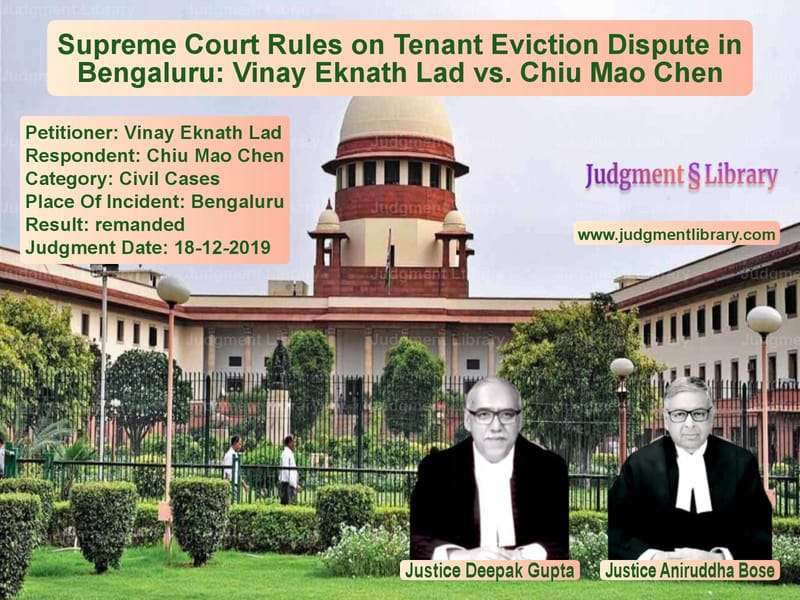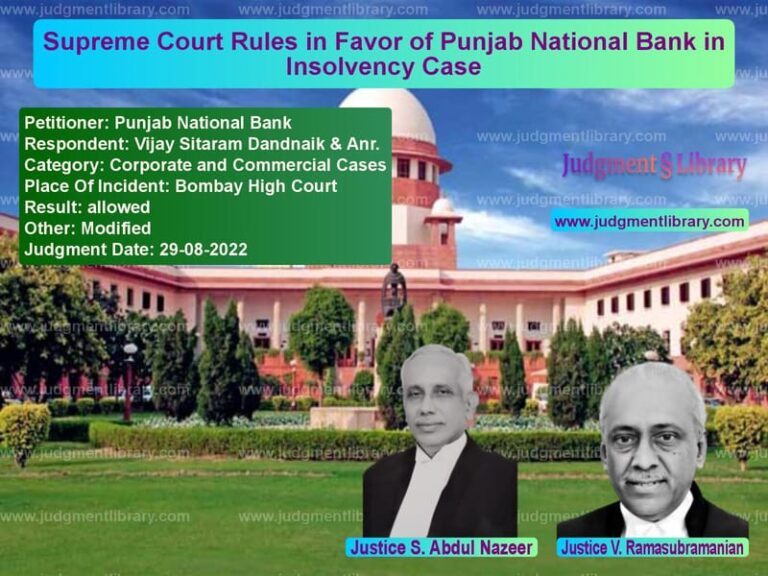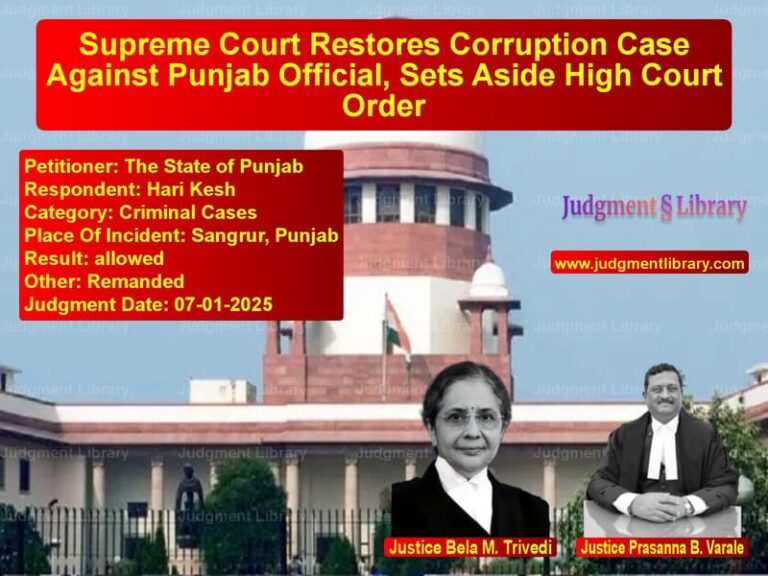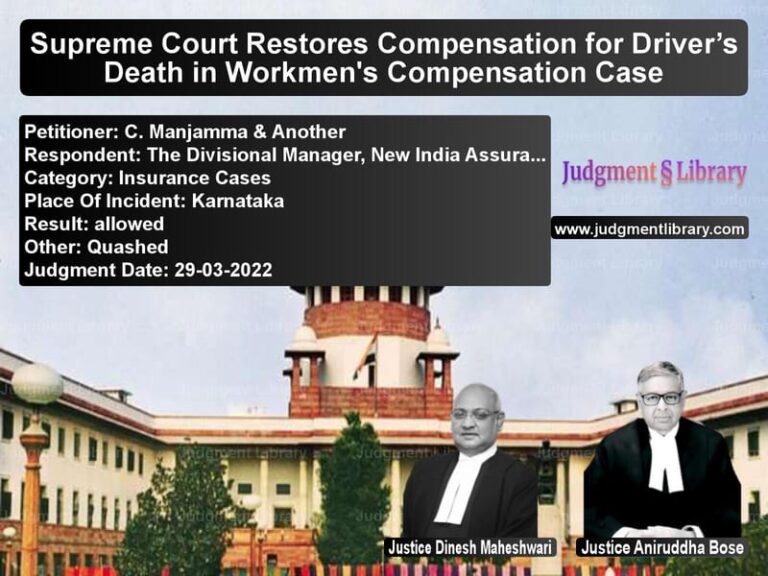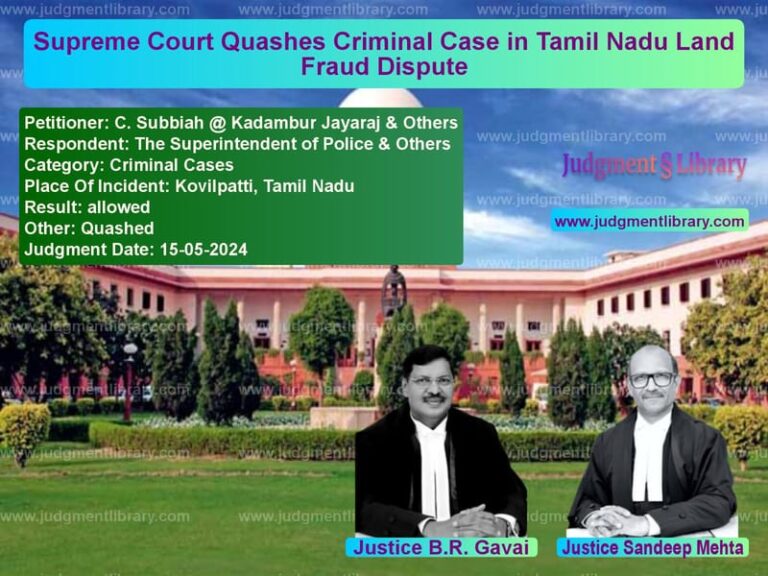Supreme Court Rules on Tenant Eviction Dispute in Bengaluru: Vinay Eknath Lad vs. Chiu Mao Chen
The Supreme Court, in Vinay Eknath Lad vs. Chiu Mao Chen, delivered a crucial judgment concerning the eviction of a tenant and the ownership rights of a co-ownership firm following the dissolution of a partnership. The case revolved around the possession of a shop located in Bengaluru and the validity of the landlord’s claim for eviction.
Background of the Case
The dispute arose over a shop located in Sabari Complex, Residency Road, Bengaluru. The mother of the respondent, Chiu Mao Chen, was originally inducted as a tenant in 1978. Upon her passing in 1996, the respondent continued to occupy the premises as a tenant. The property was originally owned by a partnership firm named “Sri Sabari Corporation,” but the firm was later dissolved, and its assets were allegedly distributed among individual co-owners.
In 2006, the co-owners of the property issued a notice under Section 106 of the Transfer of Property Act, terminating the tenancy and demanding possession. When the respondent refused to vacate, the co-owners filed a suit in the City Civil Court, Bengaluru, seeking possession and mesne profits. The trial court ruled in favor of the co-owners, but the Karnataka High Court reversed the decision, leading to an appeal before the Supreme Court.
Legal Issues Before the Supreme Court
- Whether the co-owners of the dissolved partnership firm had the legal standing to file an eviction suit.
- Whether the tenant had attorned to the co-owners as his new landlords.
- Whether the dissolution of the partnership firm resulted in a valid transfer of property ownership to the co-owners.
- Whether the eviction notice under Section 106 of the Transfer of Property Act was validly served.
Arguments by the Appellant (Vinay Eknath Lad & Co-owners)
- The appellant argued that after the dissolution of the partnership firm, the property was divided among the former partners and their legal heirs, forming a co-ownership structure.
- The co-owners were the rightful landlords and were entitled to terminate the tenancy and reclaim possession.
- The tenant was aware of the dissolution and had accepted the new ownership structure by continuing to pay rent.
- The eviction notice was properly served and in compliance with the Transfer of Property Act.
Arguments by the Respondent (Chiu Mao Chen)
- The respondent contended that he had never attorned to the new co-owners and continued to recognize only the original partnership firm as his landlord.
- There was no public notice issued regarding the dissolution of the partnership, nor was there any formal attornment by the tenant.
- The documents relied upon by the co-owners to claim ownership were inadequately stamped and therefore inadmissible.
- The eviction notice was defective and not served in accordance with the law.
Supreme Court’s Judgment
The Supreme Court set aside the Karnataka High Court’s ruling and remanded the matter for reconsideration. The Court held that the co-owners had not provided sufficient evidence to prove their ownership over the property following the dissolution of the partnership.
The Court observed:
“In the absence of public notice and proper documentation, the tenant was justified in questioning the ownership claims of the co-owners.”
It further held:
“While a tenant is generally estopped from challenging the title of his landlord, this principle does not apply when the alleged new landlords fail to establish their derivative title.”
The Court also referred to Section 109 of the Transfer of Property Act, which states that a transferee of leased property can exercise the rights of the original lessor, but only if there is a valid and recognized transfer.
Key Takeaways from the Judgment
- Tenants cannot challenge the title of their original landlord but may contest the derivative title of a new owner if proper attornment has not occurred.
- Upon the dissolution of a partnership firm, property distribution among co-owners must be properly documented and registered to be legally recognized.
- Public notice and proper attornment are essential in tenancy cases where ownership changes.
- Eviction suits must be backed by clear and valid ownership claims.
Final Decision
- The Supreme Court remanded the matter to the High Court for reconsideration.
- The appellants were granted the opportunity to produce additional evidence to substantiate their ownership claims.
- The respondent-tenant was permitted to continue occupying the premises until the High Court’s final ruling.
Implications of the Judgment
This ruling clarifies the legal position on tenant attornment and the rights of co-owners following the dissolution of a partnership. It underscores the importance of proper documentation and legal procedures in property transfers and eviction cases.
Petitioner Name: Vinay Eknath Lad.Respondent Name: Chiu Mao Chen.Judgment By: Justice Deepak Gupta, Justice Aniruddha Bose.Place Of Incident: Bengaluru.Judgment Date: 18-12-2019.
Don’t miss out on the full details! Download the complete judgment in PDF format below and gain valuable insights instantly!
Download Judgment: Vinay Eknath Lad vs Chiu Mao Chen Supreme Court of India Judgment Dated 18-12-2019.pdf
Direct Downlaod Judgment: Direct downlaod this Judgment
See all petitions in Property Disputes
See all petitions in Landlord-Tenant Disputes
See all petitions in Specific Performance
See all petitions in Judgment by Deepak Gupta
See all petitions in Judgment by Aniruddha Bose
See all petitions in Remanded
See all petitions in supreme court of India judgments December 2019
See all petitions in 2019 judgments
See all posts in Civil Cases Category
See all allowed petitions in Civil Cases Category
See all Dismissed petitions in Civil Cases Category
See all partially allowed petitions in Civil Cases Category

